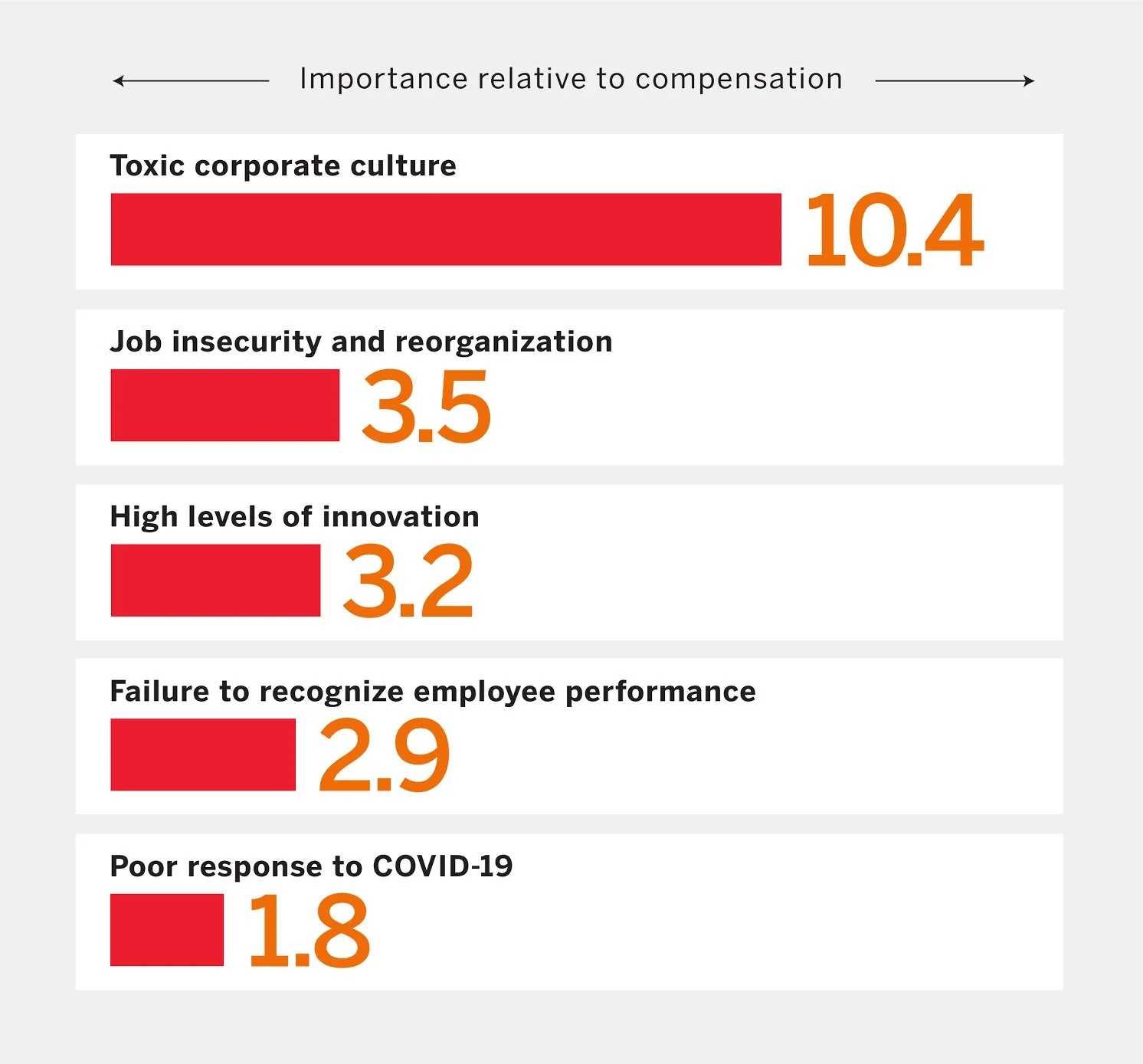The Great Resignation: It’s the culture, stupid!
In the i newspaper on 8th January there was an editorial on The Great Resignation and its impact on the NHS (How to stop the exodus of NHS staff). This resonated with me because I have been working with #Blend Associates to offer talent retention coaching to senior leaders in the NHS and because I am a product of the Great Resignation!
It wasn’t until November that I first heard the phrase and realised that I am part of a ‘thing’. Of course, the NHS is not the only organisation here, or elsewhere, that is impacted by the tightening of labour markets, talent shortages and an outflow of ‘regretted loss’ talent. Whether you call this the Great Reshuffle, as not all this talent is leaving the market, is immaterial.
We all know that the disruption of having to replace a high performing individual takes at least 12 months to fix and can have a domino effect as the slack has to be taken up by already maxed out colleagues. It is, or should be, a high priority for senior executives and their HR teams in 2022. So why is this happening?
In short, and to misquote Bill Clinton’s election slogan in 1992, it’s about organisational cultures. In this article we shall explore some of the reasons for this phenomenon, describe how that might play out for individuals in your organisations and suggest some ideas on how you can go about shifting the dial to minimize the risk to your organisation.
It’s the culture, stupid!
There has been a noticeable increase in people resigning from roles, not leaving through redundancy, on both side of the Atlantic. This has tweaked the interest of many academics, business consultants and commentators, here’s a taster of what they are saying:
Dr Anthony Klotz is an associate professor of management at Texas A&M University, and the studies workplace exits. He told Newsday that people have been simplifying their lives:
“There is evidence that people have been doing thinking during the pandemic in terms of how their life is going and have had some epiphanies and decided they want to make some changes to their life. And this could involve deciding to leave the workforce and stay home with family, to start a business, to pursue a hobby, perhaps retire early.”
Is this just about the pandemic? Or have the prevalent corporate cultures in the West been storing up a problem for years that the pandemic has just shone a new light on?
Simon Sinek, darling of TED talks and one of my favourite leadership thinkers, has this to say in one of his recent video posts on LinkedIn:
Sinek talks about the evidence of businesses with ‘medocre’ cultures suffering higher levels of employee turnover. And to quote another well known management thinker, Peter Drucker
“Culture eats strategy for breakfast”
Revelio Labs have gone a step further and identified that those with Toxic cultures are much more likely to have higher turnover rate than those without. Their analysis found that the leading elements contributing to toxic cultures include failure to promote diversity, equity, and inclusion; workers feeling disrespected; and unethical behaviour.
Top Predictors of Attrition During the Great Resignation
The authors analysed the impact of more than 170 cultural topics on employee attrition in Culture 500 companies from April through September 2021. These five topics were the leading predictors of attrition. Each bar indicates the level of importance of each topic for attrition relative to employee compensation. A toxic culture is 10.4 times more likely to contribute to attrition than compensation. (Toxic Culture Is Driving the Great Resignation – MIT Sloane Management review - https://mitsmr.com/3nfrMtE).
So, what can be done and who should you call?
A personal story
Before we get on to that a brief personal insight. I had been working for my last employer for 5 years, an acquisition specialist in the UK pension market. In that time, the scope of my role, and of those I worked with, had expanded with the growth of the business from 700 employees to 7500. Part of the Simon Sinek view that the ramping up of pressure on employees has been going on for years.
Overlay the inevitable and expected constant change and transitioning as we merged ever larger business together, 2020 brought two more disruptive events. The first was Covid (enough said) and the second was a new CEO who brought a new purpose and vision to the business. This was massively exciting, thoroughly called for and very well received. Unfortunately, it had one obvious impact – we also announced a new business structure, which lead to even more change and transition projects!
This led to a senior leadership group in the business who were on their knees by the end of 2020. As a coach and talent consultant I was hearing constantly the impact this was having on people and their connection with life outside work. In January 2021 this became too much for me to handle and I had to step away from work to take some time off to recover my health. I know I am not alone in being in such a place and my employers were brilliant in terms of sick leave policies, Mental First Aiders, and private health cover. I was well supported and looking to return to work as soon as I could so as not to let people down.
Then a funny thing happened, as I recovered my equilibrium, I spent more time looking more objectively at my life and what I wanted from it. Having real time…….and I mean months…..to reflect, meditate, read, walk, play tennis, cook, and spend proper time with the extended family enabled me start to formulate a new life plan. A plan to lead a fulfilling life with multiple aspects to it, including volunteering, that meant that full-time work was not attractive any more. And just to be clear I didn’t work for a business that had a toxic culture, I just found the whole idea of corporate cultures difficult to reconcile with the life I wanted to pursue.
What I realised is that my experience gave me a great perspective into what might be possible to do within organisations to reduce the likelihood and impact of this trend. So, I took the decision to leave the world of employment and set up the coaching business I had been talking about for at least 10 years!
What This Means for Leaders
Are organizations picking up on these trends and acting swiftly enough? And when we say ‘organisations’ we mean the key influencers within it, especially senior leaders.
In the long-term leaders need to set the tone from the top and make sure that they drive down through the business an engaging and empowering culture that allows a diverse (in all senses of the word) range of employees to be the best version of themselves at work. How you do that will be the subject of years of work and most of my future blogs #leadership #organisational development #talent development #culture #coaching #team coaching
In the short term, the actions that might have made a difference to me were:
reducing the pressure to continue to deliver more, with less, in larger, more complex organizations
really look at providing dynamic and flexible ways in which people are employed, beyond just ‘hybrid’ working. Its interesting that almost all roles I see advertised are still Full Time!
Revelio Labs suggest four short-term actions from their study;
Provide opportunities for lateral job moves. Not all employees want to climb the corporate ladder or take on additional work or responsibilities. Many workers simply want a change of pace or the opportunity to try something new. When employees talk positively about lateral opportunities — new jobs offering fresh challenges without a promotion — they are less likely to quit.
Sponsor corporate social events. Company-organized social events, including happy hours, team-building excursions, potluck dinners, and other activities outside the workplace are a key element of a healthy corporate culture, so it’s no surprise that they are also associated with higher rates of retention.
Offer remote work options. Much of the media coverage of the Great Resignation has focused on the importance of remote work in retaining employees. Unsurprisingly, when employees discussed remote work options in more positive terms, they were less likely to quit. What you might not have expected is the relatively modest impact of remote work on retention — just a bit more powerful than compensation in predicting lower attrition. Remote work options may have a modest effect on employee turnover because most companies in an industry converge on similar policies.
Make schedules more predictable for front-line employees. When employees describe their schedules as predictable, they are less likely to quit. Having a predictable schedule is six times more powerful in predicting front-line employee retention than having a flexible schedule.
To return to the NHS, the i article had lots of suggestions on what NHS leaders could do, not of all of which will be relevant for other businesses, but you get the drift in brackets of some possible themes:
1. Bring back full bursaries for student nurses (invest in training people to fill your talent pipeline or do key roles)
2. More nurseries in hospitals (remove barriers for parents and other diverse groups to return to work)
3. Better safety and protection (what working conditions, including psychological safety, would encourage people to stay)
4. Improve health and well-being (common to all organizations and includes support for those suffering burnout or other mental health issues)
Finally, I have noticed is that organisations are very keen to support people with 1-2-1 support once they are leaving (e.g., traditional outplacement) or when they are off sick (e.g. occupational therapy, counselling etc.). What about providing quality career coaching to people to explore some of the questions I did without having to take 6 months off work? What if you could reduce the exodus by even 25% by offering this service? Especially, if these are people in key leadership or consultant roles that majorly impact the services offered to hundreds of thousands of people. This is exactly what some of the NHS trusts are doing through the career coaching provided by #Blend Associates.
Conclusion
The Covid pandemic has brought about many unexpected phenomena and the Great Resignation is one of many. There is mounting evidence that people in increasing numbers are waking up from ‘sleep walking’ in organisational cultures that are mediocre, at best, and toxic at worst. Where they can they are voting with their feet and causing significant problems for the organisations they are leaving behind.
Leaders need to take a strategic look at the workplace of the future and mitigate the affects of the great resignation by rebuilding their corporate cultures. This will take time and sustained effort. In the meantime, they can take short-term actions to address some of the causes of employee exits, including providing talent retention coaching to key groups and individuals.
If you would like to discuss any of the topics raised in this article, or to start a conversation about talent retention coaching please get in touch chris@silverhowecoaching.com



